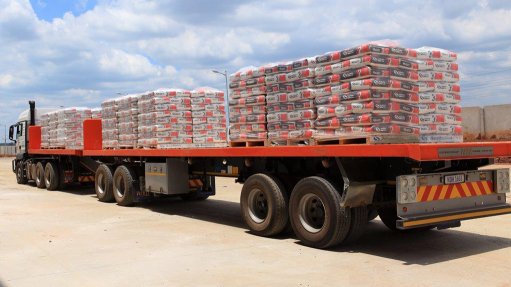
JSE-listed Sephaku Holdings on Tuesday reported that its subsidiary Dangote Cement South Africa, or Sephaku Cement (SepCem), had been heavily affected by the depressed macroeconomic environment during the year ended December 31, 2018.
The company stated that low cement demand, owing to the weak economy, was exacerbated by intense competition between cement manufacturers, blenders and importers.
Consequently, SepCem’s sales volumes were 6.4% lower year-on-year.
Price increases were implemented in February and August 2018, resulting in a 3.5% average increase per tonne. The price increase was lower than targeted because of a higher volume proportion of bulk cement and price competition in highly contested markets.
SepCem’s revenue decreased by 3.1% to R2.29-billion, compared with R2.37-billion in 2017, owing to the lower volumes. The company’s earnings before interest, taxes, depreciation and amortisation margin was 20.1% at R461.5-million, compared with 21.3% at R504.2-million for 2017.
The profit margins were further impacted on by above-inflation cost increases in inputs such as coal, electricity and fuel. Further, owing to the low quality of coal available to the local market, the associate had a higher-than-planned maintenance cost, which contributed to the lower-than-targeted margins.
SepCem has started various initiatives to eliminate and/or mitigate against these challenges in the current financial year.
Meanwhile, the company’s net profit for 2018 was R128.7-million, mainly owing to a R81.7-million tax credit that was granted in 2018 for the 2017 tax period. The 12L tax incentive provides for an energy efficiency tax allowance to be claimed at 98c/kWh for the energy savings achieved against a set baseline.
SepCem achieved a total energy saving of 307-million kilowatt-hours against the set baseline based on the energy efficiency of a modern plant.
MÉTIER
Meanwhile, SepCem’s Métier Mixed Concrete subsidiary continued to experience intense competition in both the Gauteng and KwaZulu-Natal markets and pricing has been declining since the beginning of the year.
“The two plants added in Gauteng over the past 24 months have supported revenue through increased sales volumes. The rationalisation of the fleet has improved cost savings, but profit margins remain under pressure owing to above-inflation increases in production costs, which is primarily as a result of additional plants in an environment with declining pricing,” SepCem said.
Further, in line with the constrained operating environment, Sephaku Holdings’ executive management had determined how best to reduce head office expenses.
The reported head office segment expenses were R22.1-million, R23.6-million and R25.3-million for the financial years 2016, 2017 and 2018, respectively.
The non-cash portion of the figure was between 21% and 22%, mainly constituting depreciation and option vesting expenses. The company’s support functions to SepCem and Métier were considered in determining how to streamline the expenses without compromising any downstream benefits.
Sephaku Holdings explored the head office’s contribution to achieving the requisite black economic empowerment accreditation in relation to accessing concrete supply contracts.
“It is essential to highlight that the reported head office segment expenses do not account for services rendered by executive management to Métier and SepCem, which if recovered, would result in expenses that reflect the inclusive figure.
“Furthermore, because of the equity accounting of SepCem, the total costs of operations are not apparent. To that effect, Sephaku Holdings’ expenses were about 6% of the total operating expenses and 1% of total costs of Métier and SepCem,” the company explained.
Sephaku Holdings began reducing expenses in October 2018 by not replacing the directors who resigned from the board and reducing executive management remuneration, among other measures.
An improvement of 8% is expected from these initial savings by March 31, relative to the 2018 financial year expenses. The full savings from these and additional reduction efforts are expected to result in expenses that are 25% lower relative to the 2018 financial year by the end of the 2020 financial year.
Moreover, SepCem expected building materials demand to remain constrained because of the challenges faced by the government in stimulating the economy in the context of high sovereign debt and loss-making State-owned entities.
“The public sector has reduced infrastructure spending in an attempt to rein in debt and to enforce fiscal discipline.
“Factors including a lack of clarity on key policies, and decreasing consumer discretionary income and demand for houses seem to have postponed private investment in infrastructure,” the company stated.
Additionally, the May national elections will potentially limit any momentum on current and planned infrastructure spend. Therefore, the outlook for the construction industry is negative, with stagnant growth in the private sector and limited public building contracts.
SepCem and Métier will continue to focus on maintaining sustainable sales volumes and reducing debt.
In January, SepCem implemented between 8% and 12% price increases per tonne.